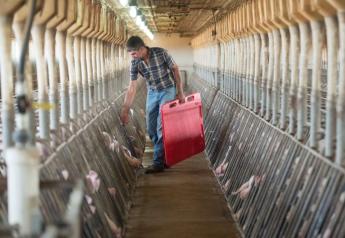Global Pork Experts Speak Up: Don’t Miss This Opportunity

The swine industry has become globally connected in a very rapid and aggressive way. Because of this, producers need to better understand their role in a global protein market that will drive business trends, cost of production and even company longevity, says Glauber Souza de Machado, a veterinarian and pork consultant with more than 25 years of global expertise, from Brazil.
“Biosecurity and herd health at the global level is also becoming a key driver and producers must fully understand how this is affecting their business,” Machado explains. “Global trends on grain and pork trade needs further comprehension by all professional producers, so that they can be really capable to manage their companies, protect their businesses and make the most relevant decisions.”
For Bruno Silva, a professor and researcher in nutrition and swine production and environmental adaptation at the Universidade Federal de Minas Gerais in Brazil, understanding the global pork market is no longer optional for today’s pork producer.
“The success of the pork business relies on having clear market insight and being able to decide if you have to intensify, specialize or diversify. This will depend on knowledge and understanding of local markets, other countries and the farm situation,” Silva says.
Silva and Machado are two of the featured speakers at United Pork Americas, a first-of-its-kind opportunity that will be held in Orlando, Fla., on Sept. 7-9.
“United Pork Americas will be a great opportunity for attendants – not only from the Americas, but from all over the world. The event is designed to conciliate technical, economical and strategic priorities for the swine industry, which makes it unique and extremely relevant to attend,” Machado says.
North and South America continue to assume a larger role in pork production, consumption and exports, Machado says, making the Americas a global leader and decisive player within the global meat market. United Pork Americas offers an opportunity to bring all these key players together for a needed discussion.
One of the goals of the event is to open up a new frontier of debates on technologies to improve the pork production chain, explains Janice Reis Ciacci Zanella, a veterinarian and researcher at Embrapa Swine and Poultry Research Center in the area of animal virology, who will also be speaking at United Pork Americas.
“It will be the meeting of the American pork production chain, bringing together farmers, researchers, entrepreneurs, executives, professors and students from all over to debate new technologies that will boost the international pork production chain in this very challenging decade marked by the coronavirus pandemic and the continuity of African swine fever outbreaks,” Zanella adds.
Having the privilege of working in both North America and South America, United Pork Americas speaker Gustavo Pizarro says he is excited to explain how collaboration between the two can be a great benefit for producers across the globe.
“We have business operations in the United States, China, Mexico and recently some activity in Brazil,” says Pizarro, president of Pipestone Latin America. “It’s interesting to me how our mission as a company – helping farmers – fits so well with this conference bringing producers from different countries together. I think this is a great opportunity to share our experience and learn how we can work together to improve production, performance and business.”
Register for the event now at unitedporkamericas.com. Don’t miss this unique opportunity to learn more about the mega trends impacting global pork production and how you can succeed in this dynamic industry.
Read More:
It’s Time to Change How We Staff Pig Farms in Face of Labor Shortage
Flavia’s Fun Five: The Best Places to Go in Orlando
Think Twice About Feed Biosecurity on Your Pig Farm
We Need You at United Pork Americas
What Can North American Pork Producers Learn from South America?







